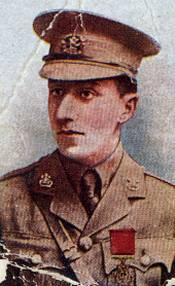Gabriel Coury facts for kids
Quick facts for kids
Gabriel Coury
|
|
|---|---|

Gabriel Coury as depicted on a cigarette card
|
|
| Born | 13 June 1896 Liverpool, Lancashire, England |
| Died | 2 February 1956 (aged 59) Liverpool, Lancashire, England |
| Place of burial |
St Peter and St Paul Churchyard, Crosby
|
| Allegiance | |
| Service/ |
|
| Rank | Captain |
| Unit | The South Lancashire Regiment Royal Flying Corps Royal Air Force Royal Army Service Corps |
| Battles/wars | First World War Second World War |
| Awards | Victoria Cross |
Gabriel Georges Coury (1896–1956) was an English soldier. He received the Victoria Cross (VC). This is the highest award for bravery in the face of the enemy. It is given to British and Commonwealth forces.
Contents
Early Life and Education
Gabriel Coury was born in Liverpool, England, on June 13, 1896. His parents were from Lebanon. He went to Stonyhurst College from 1907 to 1913.
After school, he started working as an apprentice. He learned about cotton trading. When World War I began in 1914, he volunteered to join the army.
Earning the Victoria Cross
Coury was a second lieutenant in the 3rd Battalion. This was part of The South Lancashire Regiment. On August 8, 1916, he showed great bravery in France. His actions earned him the Victoria Cross. This award is given for extreme courage. He was also promoted to a full lieutenant.
Serving in the Air Force
In November 1916, Coury joined the Royal Flying Corps. This was the air force at the time. He worked as a flying officer and observer.
On April 1, 1918, he moved to the new Royal Air Force (RAF). He became a temporary captain in the RAF. When World War I ended, he left the military as a captain.
After the Wars
After World War I, Coury went back to his old job. He continued to work as a cotton broker.
When World War II started, he joined the Royal Army Service Corps. He took part in the Normandy Landings. This was a very important event in the war.
His Legacy
Gabriel Coury is remembered at his old school. There is a memorial at St Francis Xavier's College, Liverpool. His Victoria Cross medal is on display. You can see it at the Queen's Lancashire Regiment Museum. This museum is in Preston, Lancashire.

